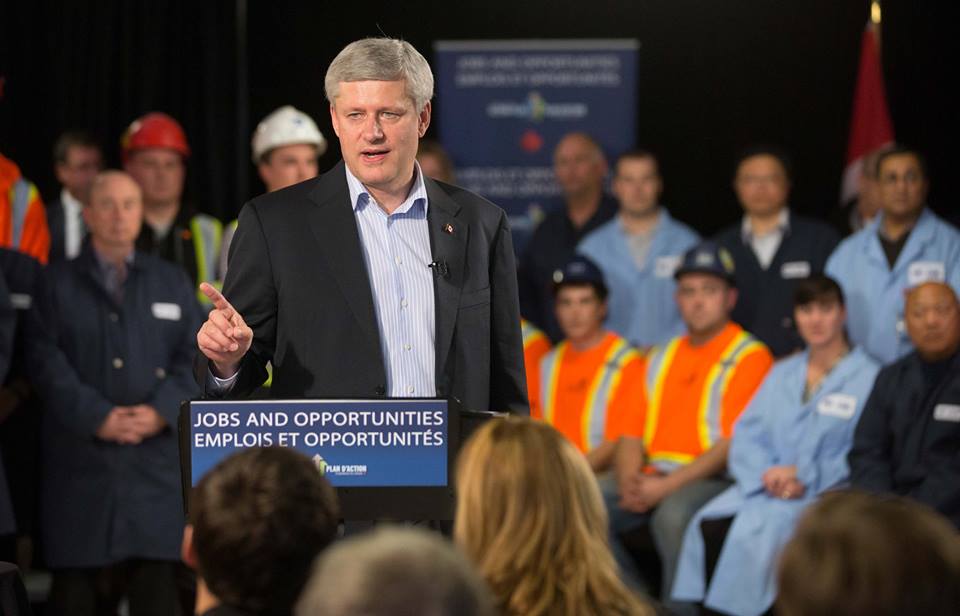Canada News
Harper government braces for grilling on oil price plunge, sputtering economy
OTTAWA — Move over Mike Duffy and Julian Fantino.
The stars of past parliamentary theatre will be supporting players on Monday as MPs return to the House of Commons and the economy takes centre stage.
The Senate expenses scandal and the government’s treatment of armed forces veterans will continue to be fodder for opposition outrage and government discomfort. But with an election on the horizon within nine months, expect MPs to train their sites primarily on the uncertain economy — the one issue most likely to move votes.
The Conservatives have made sound fiscal management the cornerstone of their re-election bid. Indeed, they’ve chided opposition MPs for ignoring economic issues in their pursuit of scandals.
Prime Minister Stephen Harper, who looked to be in campaign-mode on Sunday, cast aside doubts and made it clear he still intends to present a balanced budget and deliver on last fall’s promise of income-splitting for families with young children, even though the collapse in oil prices has sucked billions out of the federal treasury and delayed the budget.
“The government’s fiscal flexibility has been reduced, at least for the short term,” Harper told a high school gym packed with Conservatives in Orleans, Ont., a suburb of Ottawa.
“To some, it’s a reason not to balance the budget. But to them, there is always a reason not to balance the budget. That’s how the small Trudeau deficits of the early 1970s became big deficits that went on for a quarter of a century, and ended up with the Liberals dramatically hiking taxes on everybody and massively cutting even the most essential of programs, our health care and education.”
For the government to focus on its economic record, it’s a case of “be careful what you wish for,” says NDP finance critic Nathan Cullen
“The economy will certainly dominate, partly because the issues have grown even more serious over the Christmas break and the problems confronting the country are more significant,” says deputy Liberal leader Ralph Goodale.
“The government has a serious set of very troubling economic issues to deal with and they’re sending a message of confusion and incompetence in addressing those issues.”
The Bank of Canada contradicted the government’s rosy assessment of the situation, in Goodale’s view, with its surprise move last week to cut its trend-setting interest rate in a bid to goose the sputtering economy.
In hopes of underscoring that contradiction, the NDP is asking the chair of the Commons finance committee to invite Finance Minister Joe Oliver and Bank of Canada governor Stephen Poloz to update the committee on the state of the economy.
But the competing narratives about the government’s economic management will extend well beyond the halls of Parliament.
Liberal Leader Justin Trudeau is scheduled to offer a tough critique of the government’s economic record at a partisan rally Monday evening. NDP Leader Tom Mulcair will offer his own assessment in a major speech on Tuesday.
If it seems like non-stop campaigning between now and the election, that’s because it is.
“There will be an election overlay over almost everything,” acknowledges Goodale, adding that’s the inevitable consequence of having a fixed election date.
The election is scheduled by law for October but New Democrats and Liberals remain suspicious that Harper may try to pull the plug sooner. Goodale, for one, “wouldn’t put it past” Harper to call an election before tabling the budget, arguing that he needs a mandate to guide the country through choppy economic waters.
While there would doubtless be some blow-back, an early election call could get the vote out of the way before the start of disgraced Tory Sen. Duffy’s trial on charges of allegedly filing fraudulent expense claims. That trial is set to begin April 7.
Whether Duffy has any more bombshells to drop, after implicating Harper’s former chief of staff for paying back his dubious Senate expense claims, remains to be seen. But Goodale says any time the Duffy matter is in the spotlight, there’s a tremendous negative, public backlash against the government.
The Conservatives have other cards to play, however, to divert the spotlight from troublesome ethical or economic issues.
The government is expected to introduce soon legislation to crack down on suspected terrorists and those who openly encourage them. Among other things, the legislation is expected to make it easier to stop suspected terrorists from boarding planes and give police greater ability to restrict their movements by lowering the threshold for obtaining a peace bond.
The legislation was promised in the aftermath of two deadly attacks on Canadians soldiers last October, one of which ended in a wild shoot-out in the halls of Parliament.
The attacks, combined with the Harper government’s decision to take part in a coalition air campaign against Islamic radicals in Iraq, helped boost the governing party’s popularity and narrow the gap with the front-running Liberals. The two parties are virtually tied, according to the most recent polls, with the NDP stalled in a distant third place.
Suspicious that Harper is playing politics with terrorism, the opposition parties intend to scrutinize the legislation closely to ensure it strikes a balance between protecting Canadians and preserving their civil liberties.
“You can’t protect freedoms while destroying those very same freedoms,” says Cullen.
Opposition parties also intend to grill the government over what they believe is “mission creep” in Iraq, where Canadian special forces have been involved in firefights with Islamic radicals. The government maintains that was strictly in self-defence but Liberals and New Democrats see it as proof that the mission, which they opposed, has expanded.
Nor have they given up on the government’s allegedly callous disregard for the plight of armed forces veterans. Harper started the new year by demoting the controversial Fantino from the veterans affairs post and replacing him with the more congenial Erin O’Toole, who has been conducting a charm offensive with veterans groups.
With files from Murray Brewster






















